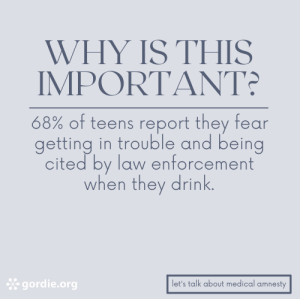What is Medical Amnesty?
"Medical Amnesty" is a statewide law and/or campus policy which grants limited legal immunity to people when they seek help for themselves or others who need immediate medical attention due to alcohol or other drug overdose, regardless of their age or the substance used. Instead of a punitive response, the student(s) may be required to meet with a counselor to confidentially assess any substance misuse concerns and discuss future planning to stay safe. Some policies may be known by the names "Good Samaritan" or "911 Lifeline." Medical Amnesty laws and campus policies can be an effective part of environmental prevention strategies.
A campus Medical Amnesty policy, coupled with strong publicity about the policy, can reduce a known barrier to getting lifesaving help in medical emergencies. A study conducted by Cornell University found that 19% of students reported "thinking about calling for help because they were concerned about someone who was severely intoxicated," but only 4% actually called for help. The primary reason students did not call for help was because they were not sure their peer was sick enough, and the secondary reason was a fear of getting the peer or themselves in trouble.
Does my state have a Medical Amnesty law?
As of 2022, 40 U.S. states and the District of Columbia have Medical Amnesty laws. To read the text of your state's law, visit the Medical Amnesty Initiative and click on your state. There is no federal Medical Amnesty law at this time. To learn if your campus has a Medical Amnesty policy, check your campus website.
Do Medical Amnesty policies work?
A 2006 study conducted at Cornell University revealed that one such medical amnesty policy along with a significant media campaign dramatically increased the number of alcohol-related calls for assistance to emergency services, and that educational interventions following those calls more than doubled over a two-year period from 22% to 52%. Student leaders felt the policy "demonstrated that the university genuinely is concerned about the health and safety of its students." Access a PDF summary of the study.
A 2018 study found that campus Medical Amnesty policies "do not increase consumption or problems and may reduce barriers to seeking help in the event of an emergency." The study also found students are also more likely to contact RAs in the event of an emergency.
I want to help my state or campus develop a Medical Amnesty law. Where do I start?
The Medical Amnesty Initiative is a nonprofit organization that advocates for the introduction and passage of Medical Amnesty legislation throughout the United States. They have helped guide many people through the process of passing Medical Amnesty laws by connecting them with their state legislators. Learn more about this great resource. If your campus does not have a Medical Amnesty policy, start out by contacting your Student Affairs office, Judicial Affairs/Student Conduct office and Student Health/Health Promotion office.
Any policy adopted by a university or college needs to be developed in accordance with state law and in consultation with legal counsel.

